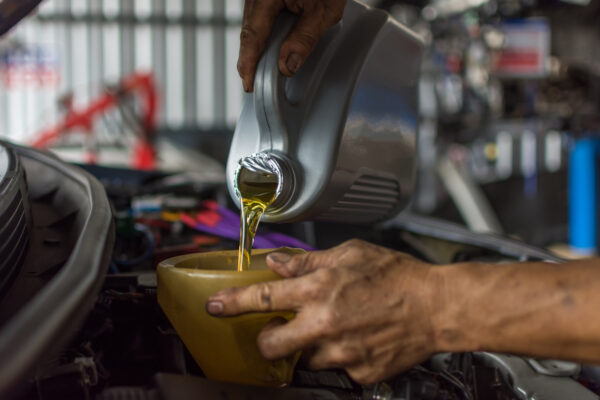Oil lubricates and reduces friction between crucial engine components like pistons, cylinders, connecting rods, crankshafts, etc. Over time, engine oil becomes contaminated and loses its viscosity and effectiveness to prevent wear and tear, which can lead to potential engine damage.
Regularly changing the engine oil in your motorcycle is crucial for maintaining its performance, prolonging its lifespan, and ensuring a smooth ride. That’s why vehicle manufacturers and mechanic recommends a regular oil change.
A fully-synthetic motorcycle oil easily lasts between 10,000 to 12,000 miles, but expert motorcycle mechanics recommend changing it between 7000 to 10,000 miles for smoother performance.
But what if you cannot recall when you changed your motorcycle oil last time? Several signs indicate your motorcycle needs an oil change.
This article will highlight six key signs indicating your motorcycle is due for fresh engine oil to help you identify when it’s time for an oil change.
6 Signs Your Motorcycle Needs Engine Oil Change
If you cannot recall when you changed your motorcycle oil last time, these signs and symptoms indicate your motorcycle is due for an oil change.

1. Hard Gear Shifting and Clutch Problems:
Are you struggling with shifting gears or putting your motorcycle into neutral? It’s a sign of an incorrect oil level in the engine case.
When the engine oil deteriorates and its level drops, it fails to lubricate the gearbox, increasing friction and making gear shifting more challenging.
You might experience difficulties in engaging gears smoothly or notice a slipping clutch. In such cases, checking and changing the engine oil is recommended to maintain proper lubrication and enhance gear-shifting performance.
2. Engine Noise and Increased Vibration:
As engine oil degrades, it loses its ability to lubricate the moving parts effectively. This can result in increased engine noise and vibration.
If you notice unusual knocking sounds or excessive vibrations from your motorcycle’s engine, it may indicate that the oil needs to be changed. Fresh oil will help reduce friction and minimize these undesirable effects.
3. Reduced Fuel Efficiency:
Old or inadequate engine oil can negatively impact your motorcycle’s fuel efficiency. As the oil breaks down, it becomes less efficient in lubricating the engine components, which leads to increased friction and energy loss.
Consequently, you may notice a decrease in fuel efficiency, requiring you to fill up more frequently. A timely oil change can help restore your motorcycle’s optimal fuel economy.
4. Overheating Engine:
Engine oil plays a crucial role in regulating the temperature of your motorcycle’s engine. It helps dissipate heat generated during operation and prevents excessive friction and wear.
If you notice that your engine is consistently running hotter than normal or your temperature gauge is consistently higher, it could indicate that the oil level is dropped or the oil has lost its heat dissipation properties.
Fresh oil will increase the heat dissipation rate, and your motorcycle engine will run smoothly without overheating issues.
5. Discolored or Dirty Oil:
One of the most obvious signs that your motorcycle needs an oil change is the appearance of discolored or dirty oil on the dipstick.
Fresh oil is usually transparent amber, while dirty or contaminated oil can appear dark and sludgy. Check the oil regularly, and if you notice a significant change in color or consistency, it’s time for an oil change.
6. Oil Smell and Contamination:
A strong and unpleasant smell can indicate that the oil has been contaminated or is reaching the end of its life. Contaminants, such as metal particles or coolant leaks, can compromise the quality of the oil and its ability to protect the engine.
Additionally, observing foam or milky residues on the dipstick could suggest a coolant leak, which requires immediate attention. Addressing these issues promptly by changing the oil and addressing any leaks can prevent further damage.
Frequently Asked Questions (FAQs)
What Happens If Motorcycle Oil isn’t Change on Time?
Regular oil changes are crucial for maintaining optimal engine performance, preventing damage, and ensuring a longer lifespan for the motorcycle. If you don’t change the engine oil on time, your motorcycle will face overheating, poor fuel economy, bad gear shifting, and faster wear and tear, which leads to decreased motorcycle life.
Can I Use Any Oil for My Motorcycle?
No, it is essential to use the oil that your motorcycle manufacturer recommends. Different motorcycles require specific types of oil with particular viscosity and additives that cater to their engine’s needs.
What Happens If Incorrect Oil is Filled in a Motorcycle?
Filling incorrect oil in a motorcycle can lead to insufficient lubrication, increased engine wear, poor cooling, clutch slippage, seal and gasket damage, and reduced fuel efficiency.
Using the recommended oil specified by the manufacturer is crucial to prevent these problems and maintain the engine’s performance and longevity. If incorrect oil is used, it should be drained and replaced promptly, and professional assistance may be required.
Conclusion:
Regularly changing the engine oil in your motorcycle is vital for ensuring optimal performance, protecting the engine, and promoting longevity. By paying attention to the signs discussed in this article, you can stay proactive in maintaining your motorcycle’s engine health.
Refer to your manufacturer’s manual regarding oil change intervals and choose the oil type for your motorcycle model. By prioritizing regular oil changes, you’ll keep your motorcycle running smoothly on the open road for years.
Written by: Bablu Yadav


